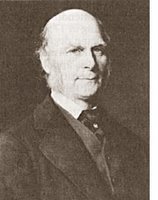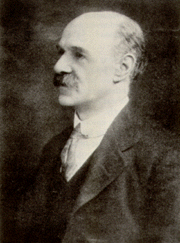 Sir Francis Galton, the father of modern mental measurement, was a cousin to Charles Darwin and greatly admired his work. Early on, he applied the principle of evolution to the human race, seeking a way to sort people by desirable traits and eventually direct the path of human evolution by determining who could and couldn't reproduce.
Sir Francis Galton, the father of modern mental measurement, was a cousin to Charles Darwin and greatly admired his work. Early on, he applied the principle of evolution to the human race, seeking a way to sort people by desirable traits and eventually direct the path of human evolution by determining who could and couldn't reproduce.The most merciful form of what I ventured to call "eugenics" would consist in natality for the indication of superior strains or races, and in so favoring them that their progeny shall outnumber and gradually replace that of the old one. (Life and Letters of Francis Galton)How is this to be done? Galton isn't clear, but he advocates the setting aside of morality.
What is meant by improvement? What by the syllable eu in "eugenics," whose English equivalent is "good"? There is considerable difference between goodness in the several qualities and in that of the character as a whole. The character depends largely on the proportion between qualities, whose balance may be much influenced by education. We must therefore leave morals as far as possible out of the discussion, not entangling ourselves with the almost hopeless difficulties they raise as to whether a character as a whole is good or bad. Moreover, the goodness or badness of character is not absolute, but relative to the current form of civilization. (The American Journal of Sociology)He produced many statistical models for the measurement of intelligence, desiring to give the study of human behavior the same respect as the natural sciences. He also founded the Eugenics Society, recently renamed the Galton Institute.
 British contemporary and admirer, Charles Spearman, was deeply impressed with Galton's concept of "general mental ability" and sought to quantify it through his own research with similar goals. In 1927, in his treatis, The Abilities of Man (page 8), Spearman writes,
British contemporary and admirer, Charles Spearman, was deeply impressed with Galton's concept of "general mental ability" and sought to quantify it through his own research with similar goals. In 1927, in his treatis, The Abilities of Man (page 8), Spearman writes,An accurate measurement of everyone's intelligence would seem to herald the feasibility of selecting the better endowed persons for admission into citizenship--and even for the right of having offspring.He set out to measure the human mind, discovering a "general factor" of intelligence called "g." he compared this to the breakthroughs in astronomy and physics, the likes of Copernicus, further attempting to give his research the impression of hard science. Analysis of his research at a village school in Berkshire is interesting and wrought with difficulty. He measured their abilites in a variety of school subjects> He found strong correlation between certain subjects, particularly the classics and language, leading him to determine his law of "Universal Unity of Intellective Function." He used this as a basis to posit that,
...public examination on school subjects would be a useful proxy for objectively measuring one's overall intelligence, and therefore determine one's place in the social hierarchy.
 Hence the idea that performance on a standardized test of school subjects equates with general intelligence and is a valid basis for sorting students and determining the opportunities that would be afforded them. Little has changed but the vocabulary in the last 80 years.
Hence the idea that performance on a standardized test of school subjects equates with general intelligence and is a valid basis for sorting students and determining the opportunities that would be afforded them. Little has changed but the vocabulary in the last 80 years.*The main difficulty with Spearman's research is that he determined that performance in specific school subjects equated with general intelligence and his test was constructed thus. Is it any surprise that a child who did well on the test would then display correlations to the measure of intelligence? His sample size is also incredibly small...a few dozen students at a village school in Berkshire.
eugenics, standardized tests, testing, education, homeschooling, Galton
